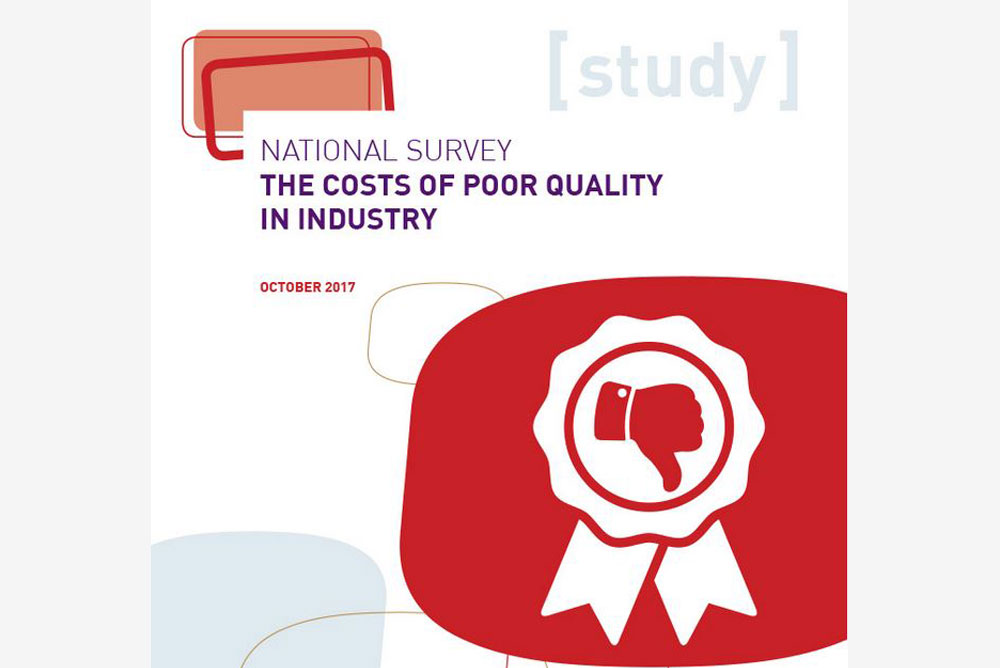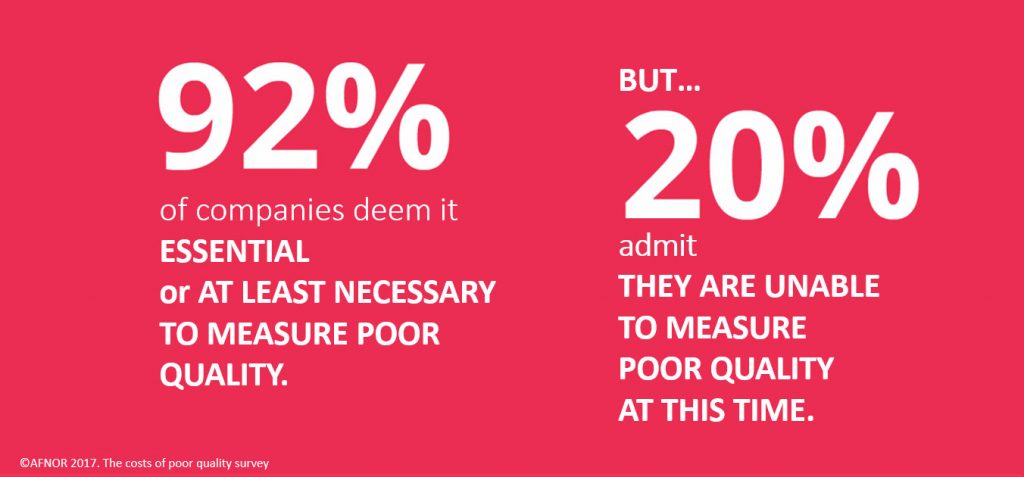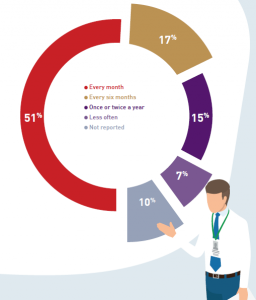AFNOR Study: the quality challenge and the underestimated costs of poor quality

AFNOR Group presents the results of a ground-breaking study where 800 industrial professionals talk about poor quality (or non-quality). Find out how they perceive and measure it, the figure they put on the related costs and the steps they take to prevent it.
AFNOR Group presents the results of a ground-breaking study conducted in October 2017 on the costs of poor quality. The study involved 816 business leaders and quality specialists working mainly in industry. It flags the difficulties they experience in terms of identifying and measuring the costs of non-quality, which nonetheless constitute an often overlooked lever for increasing sales revenue.
A notable fact: industrial players overwhelmingly equate non-quality with non-conformance, in other words the fact that a product does not comply with the specification or technical requirements (scrap, re-works, repairs, returns under warranty, etc.). On the other hand, they do not equate it with “non-performance”, which has a more managerial dimension and is associated with the organization’s strategy.
A cost estimated at 5%, or less, of sales revenue
There is a broad consensus that non-quality must be measured: 92% of enterprises consider this essential or at least necessary. But not all of them know how or are capable: 20% of manufacturers admit that they do not have the capability at this point in time. Among those who can, two thirds estimate the cost at up to 5% of sales revenue and one in six at above 10%. However, in the view of 37%, these measures do not correspond at all to the reality of the situation or only to a tiny part of it.

Another cause for concern: the subject of non-quality is not sufficiently brought to the attention of higher levels. Only half of the respondents say that they report monthly to top management on the subject. 33% of the organizations do not communicate on the subject to their teams. And worse, 26% take no corrective action. Although staff turnover and occupational illnesses are taken account of in 30% and 20% of cases, this does not apply to lack of personnel involvement, inadequate management and societal risks, which are virtually never measured. And so, given such deficiencies, the measurement of non-quality is not the management tool it is theoretically supposed to be !
 “Organizations want to act, but the majority paint a rather poor picture of their ability to identify, measure and use non-quality indicators that could be central to their strategy. In a few months’ time AFNOR Group will offer an online service enabling organizations to adopt suitable quality indicators and compare them with organizations in the same sector. Indiko Quality will help organizations and their top management to properly address the key issue of non-quality. In 2018 we will offer platforms, meetings and clubs by areas of activity or by region. This concerted approach will provide organizations with a benchmark so that they can find the most relevant indicators for them and the appropriate monitoring methods”, comments Anne-Laure Mauduit, Innovation and Planning Manager with AFNOR Group.
“Organizations want to act, but the majority paint a rather poor picture of their ability to identify, measure and use non-quality indicators that could be central to their strategy. In a few months’ time AFNOR Group will offer an online service enabling organizations to adopt suitable quality indicators and compare them with organizations in the same sector. Indiko Quality will help organizations and their top management to properly address the key issue of non-quality. In 2018 we will offer platforms, meetings and clubs by areas of activity or by region. This concerted approach will provide organizations with a benchmark so that they can find the most relevant indicators for them and the appropriate monitoring methods”, comments Anne-Laure Mauduit, Innovation and Planning Manager with AFNOR Group.
ISO 9001, for effective monitoring of non-quality as part of a continual improvement approach
In addition, the study lists some simple rules for addressing these issues in a more effective way, in terms of both indicators and management. Rules that will be optimally effective if they are put in place in the framework of a continual improvement approach, leading to a certification. ISO 9001 enables organizations to deploy a management system with relevant indicators, manage tensions and identify malfunctions in order to progress. More vertically, standards such as ISO 20400 (sustainable procurement) will help you identify then eliminate non-compliant suppliers, ISO 50001 (energy management) over-consumptions of energy, OHSAS 18001 and the future ISO 45001 (occupational health and safety) malfunctions associated with health and safety at work.
The study also highlights a real benefit of being certified: in enterprises holding certification there is improved confidence in measured costs. More aware of the problem, immersed in a culture more open to the idea of room for error, employees feel less constrained in terms of reporting information! Following the success of this study, AFNOR Group intends to repeat the exercise with service organizations in 2018.
Study methodology
Study conducted in 2017 via an online questionnaire. Over 800 respondents contributed thereby forming a representative sample of the French industrial fabric in terms of business areas, sales figures, geographic distribution and export activities.

